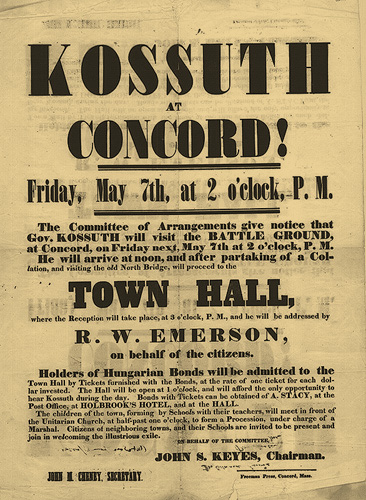R. W. E. tells me he does not like Haynes as well as I do. I tell him that he makes better manure than most men.
No man stands on truth. They are merely banded together as usual, one leaning on another and all together on nothing; as the Hindoos made the world rest on an elephant, and the elephant on a tortoise, and had nothing to put under the tortoise.
You can pass your hand under the largest mob, a nation in revolution even, and, however solid a bulk they may make, like a hail-cloud in the atmosphere, you may not meet so much as a cobweb of support. They may not rest, even by a point, on eternal foundations.
But an individual standing on truth you cannot pass your hand under, for his foundations reach to the centre of the universe. So superficial these men and their doings, it is life on a leaf or a chip which has nothing but air or water beneath. I love to see a man with a tap-root, though it make him difficult to transplant.
It is unimportant what these men do. Let them try forever, they can effect nothing. Of what significance the things you can forget?
A little thought is sexton to all the world.
I see the slate-colored snowbird still, — a few.
What was that large olive-yellow bird on Heywood's apple trees?
The female flower of the sweet-gale, red, like so many female flowers.
The meadow-sweet begins to leave out.
The male flowers of the maple look yellowish-scarlet, looking up to the sky.
The elms are still in full blossom.
The cowslip's is a vigorous growth and makes at present the most show of any flower. Leaf, stem, bud, and flower are all very handsome in their place and season. It has no scent, but speaks wholly to the eye. The petals are covered at base with a transparent, dewy (dew-like), apparently golden nectar. Better for yellows than for greens.
I hear trees creak here (at Saw Mill Brook) like inn signs in the street.
The singularly rough winged (?) barked elms here, which run up so high, blossom only at top. They are very easy to climb, the bark is so rough and furrowed and soft, affording a support to the clothes. The bark on the twigs strips up long. A kind of corky bark, but flower like the common.
The little frogs begin to peep in good earnest toward sundown.
H. D. Thoreau, Journal, May 4, 1852
The female flower of the sweet-gale. See May 10, 1857 (“I observe that the fertile flowers of many plants are more late than the barren ones, as the sweet-gale (whose fertile are now in prime),”)
The little frogs begin to peep in good earnest toward sundown. See April 5, 1858 ("I hear the hylodes peeping now at evening, being at home, though I have not chanced to hear any during the day. They prefer the evening.");April 26, 1854 ("The hylodes commonly begins early in the afternoon, and its quire increases till evening."); May 2, 1852 (" The little frogs peep more or less during the day, but chiefly at evening twilight, rarely in the morning. ."); May 3, 1852 ("They begin to peep in earnest at or before sundown, and they keep it up now at 10 P. M. But I rarely hear any numbers in the morning, when they probably sleep "); May 5, 1860 ("The peepers and toads are in full blast at night. "); May 6, 1858("In the mornings now, I hear no R. palustris and no hylodes, but a few toads still, but now, at night, all ring together, the toads ringing through the day, the hylodes beginning in earnest toward night and the palustris at evening. I think that the different epochs in the revolution of the seasons may perhaps be best marked by the notes of reptiles."); . June 5, 1860 ("When I open my window at night I hear the peeping of hylodes distinctly through the rather cool rain (as also some the next morning ), but not of toads; . . . The hylodes evidently love the cooler nights of spring ; the toads, the warm days and nights of May. Now it requires a cool (and better if wet) nigh , which will silence the toad , to make the hylodes distinct")






No comments:
Post a Comment